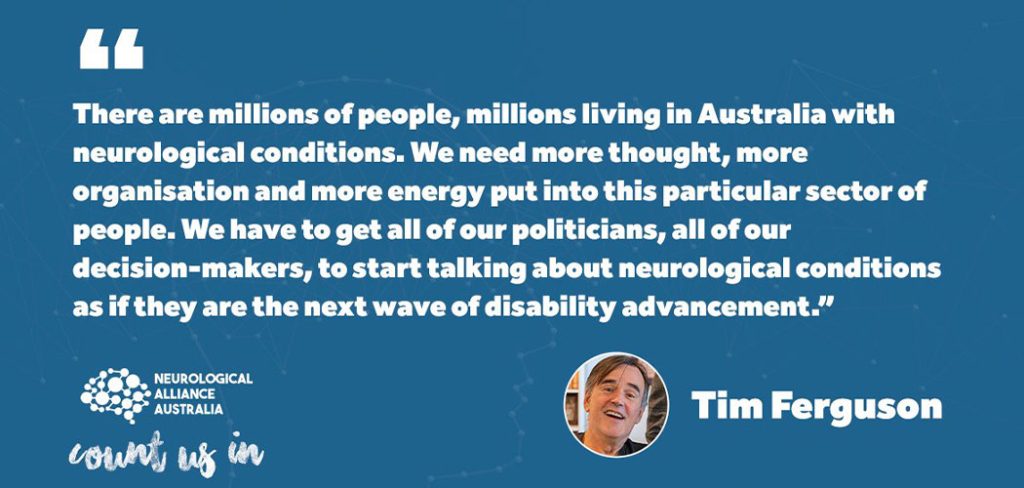“There are millions of people, millions, living in Australia with neurological conditions. We need more thought, more organisation and more energy put into this particular sector of people,” says acclaimed comedian and disability advocate, Tim Ferguson, who lives with multiple sclerosis (MS).
“We have to get all of our politicians, all of our decision-makers, to start talking about neurological conditions as if they are the next wave of disability advancement.”
Mr Ferguson’s call to action is part of a new Count Us In campaign, launched today at a National Summit on Neurological Conditions at Parliament House in Canberra, to help drive meaningful change by raising awareness, advocating for policy reforms, and empowering people affected by neurological conditions.
A recent study released by The Lancet Neurology revealed that as many as one in three people worldwide live with a neurological condition, making them the leading cause of illness and disability globally. Similarly, the Australian Institute of Health and Welfare (AIHW) identified neurological conditions among the nation’s top five disease burdens, with an estimated annual impact on the economy of over $100 billion.
Despite the statistics, neurological conditions remain under-recognised and underfunded.
Today’s summit, run by Neurological Alliance Australia (NAA), the nation’s peak advocacy body for people living with these conditions, is calling for urgent change, including the establishment of a Taskforce for Neurological Conditions, greater investment, a national neurological data set, and dedicated neurological research funding to help discover better treatments and, ultimately, cures.
Neurological conditions, such as Parkinson’s, Motor Neurone Disease, and Dementia, are incurable, and typically progressive and degenerative, resulting in significant disability.

On the rise in Australia and worldwide, Chair of the NNA and MS Australia CEO, Rohan Greenland, says neurological conditions are not being adequately addressed as a group of disease.
On the rise in Australia and worldwide, Chair of the NNA and MS Australia CEO, Rohan Greenland, says neurological conditions are not being adequately addressed as a group of disease.
“Without effective strategies in place to mitigate their impact, they are a ticking time bomb on our health system and economy,” Mr Greenland warned.
The national summit, which aims to bring together key decision-makers together, will hear from a panel of people with lived experience of neurological conditions, as well as Assistant Minister for Health and Aged Care, Ged Kearney, and Minister for the NDIS, Bill Shorten.
The Count Us In campaign video highlights six pressing areas of need to be comprehensively progressed by a Taskforce for Neurological Conditions.
1. Greater investment in medical research
2. A stronger NDIS (National Disability Insurance Scheme)
3. Equal access to assistive technology
4. Establishment of a national neurological dataset
5. An end to NDIS age discrimination
6. Improved Aged Care, Health and Disability sector integration
NAA Deputy Chair and Emerge Australia CEO, Anne Wilson, believes a Government Taskforce could address the unique challenges faced by people living with neurological conditions, set priorities and advance investment in research, facilitate timely diagnosis and enhance access to treatments, support and services to mitigate disease progression and future healthcare and disability care costs.
“Every Australian knows someone living with a neurological condition, and witnesses the lifelong impact on that person, together with their family, friends and carers,” Ms Wilson says.
“What we urgently need today is for all the major Parties to acknowledge the impact of neurological conditions and work with the Neurological Alliance Australia to give hope and certainty to Australia’s neurological community.”








